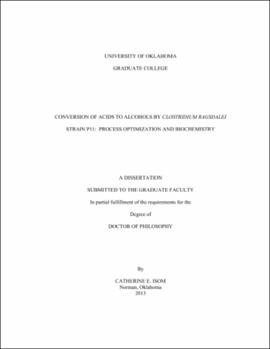| dc.contributor.advisor | Tanner, Ralph S | |
| dc.creator | Isom, Catherine E. | |
| dc.date.accessioned | 2019-06-03T20:35:52Z | |
| dc.date.available | 2019-06-03T20:35:52Z | |
| dc.date.issued | 2013 | |
| dc.identifier | 99324903602042 | |
| dc.identifier.uri | https://hdl.handle.net/11244/320229 | |
| dc.description.abstract | Research focus was directed toward the development of a biocatalyst that can be used to produce commodity chemicals and transportation fuels from volatile fatty acids ubiquitous in waste biomass. Clostridium ragsdalei was introduced to serve as an exemplar carboxidotrophic acetogen that reduces VFAs to alcohols of the same carbon structure with only acetate and ethanol as by-products of the fermentation. This dissertation developed a better understanding of this process in C. ragsdalei and, in turn, other similar bacteria and to supported previous discoveries as they relate to carboxylate reduction in acetogens. Additionally, pure culture studies allowed for a more detailed understanding of the biochemical behavior response to different compounds without skewing the results due to the influence of other species. | |
| dc.format.extent | 149 pages | |
| dc.format.medium | application.pdf | |
| dc.language | en_US | |
| dc.relation.requires | Adobe Acrobat Reader | |
| dc.subject | Biomass energy | |
| dc.subject | Clostridium | |
| dc.subject | Anaerobic bacteria | |
| dc.subject | Catalysis | |
| dc.title | Conversion of acids to alcohols by Clostridium ragsdalei strain P11: Process optimization and biochemistry | |
| dc.type | text | |
| dc.type | document | |
| dc.thesis.degree | Ph.D. | |
| ou.group | College of Arts and Sciences::Department of Microbiology and Plant Biology | |
